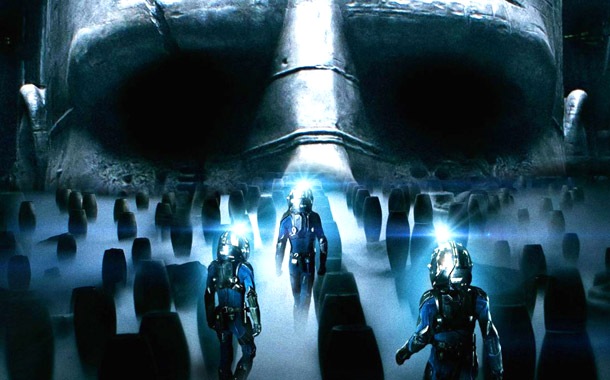Greyhoos has a post that links to a very interesting long reads article by anthropologist David Graeber about the stagnation of technology and the failure of imagination under the restraints of neoliberalism (cleverly presented under the pop sociology guise of a "Where's My Jetpack?" article). Do yourself a favor and read the whole thing, even if you don't normally read stuff like this. Like Greyhoos, I'm skeptical on a few points and generally disagree with a couple others, but it's a fascinating overview of the march into the unbrave not-so-new world of 2.0-as-messianic-stand-in.
The sections of the space race made me think of the universally shrugged-at Alien prequel Prometheus. Here's Graeber:
"The American victory in the space race meant that, after 1968, U.S.
planners no longer took the competition seriously. As a result, the
mythology of the final frontier was maintained, even as the direction of
research and development shifted away from anything that might lead to
the creation of Mars bases and robot factories.
"The standard line is that all this was a result of the triumph of the
market. The Apollo program was a Big Government project,
Soviet-inspired in the sense that it required a national effort
coordinated by government bureaucracies. As soon as the Soviet threat
drew safely out of the picture, though, capitalism was free to revert to
lines of technological development more in accord with its normal,
decentralized, free-market imperatives—such as privately funded research
into marketable products like personal computers. This is the line that
men like Toffler and Gilder took in the late seventies and early
eighties.
"In fact, the United States never did abandon gigantic,
government-controlled schemes of technological development. Mainly, they
just shifted to military research—and not just to Soviet-scale schemes
like Star Wars, but to weapons projects, research in communications and
surveillance technologies, and similar security-related concerns. To
some degree this had always been true: the billions poured into missile
research had always dwarfed the sums allocated to the space program. Yet
by the seventies, even basic research came to be conducted following
military priorities. One reason we don’t have robot factories is because
roughly 95 percent of robotics research funding has been channeled
through the Pentagon, which is more interested in developing unmanned
drones than in automating paper mills."
One of the many clueless elements of Prometheus was the introduction of Guy Pearce's eccentric billionaire Peter Weyland (it's Weyland Corporation that sends out exploratory mission in later Alien films), who has apparently funded a multi-billion dollar project to discover the origin of the species. The assumption is that he's somehow done this through R&D at Weyland Corp. and not out-of-pocket, but, as Graeber's article points out, it's highly implausible that shareholders or board members would ever let the project get that far (particularly given how secretive the whole ordeal appears to be). Along with the notion that all the proven evidence of evolution appears to be bunk, the idea that capitalism would take a leap of faith and loan out seed money towards a high-risk, no-profit, zero-yield expedition requires a massive suspension of disbelief on the part of audiences. Of course, Weyland still turns out to be hideous, and not just Pearce's atrocious makeup job. But his failing is less driven by professional ambition than personal vanity and narcissism, making the film far less interesting than the film it loosely precedes.
What was unique about the original Alien at the time, coming out in the wake of Jaws, 2001, and Star Wars, and appearing to piggyback on them, was how it followed in the post-Cold War logic described by Graeber in the article linked to above of anticipating the privatization of deep space exploration which never came. Only in Ridley Scott's original vision, this was not necessarily the result of a victory of the imagination, but a market-driven imperative. The attempt to capture the titular Alien, who has developed the ultimate defense mechanism (acidic blood), is a military expedition, the goal being to weaponize the Alien and use him against the home country's enemies. Though this is the primary mission, the objective is hidden from the team, who are mere technicians on the trip, physical rather than mental labor who think they have been sent on a mining trip. In fact, the only one who knows the crew's true goal is a cyborg, Graeber's robot worker who was supposed to replace the labor force, but is here only used for insurance, as well as the administrative review of the unpredictable humans on board.
On board the Alien ship Nostromo, the lights flicker, things break down, and grime is on everything. This placed the film in stark contrast with Star Wars, whose future was somehow impeccably clean and flawlessly operational. In Alien, it's the future, where commercial space travel is an option, but still, nothing works. Even the food is terrible. The market hasn't made these ships any more durable and the infrastructure of labor relations seems to remain completely in tact. In other words, the future is just like now, but with space trips and robots.

